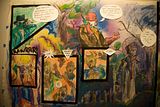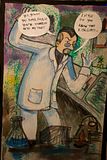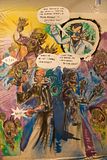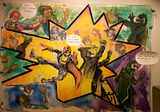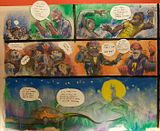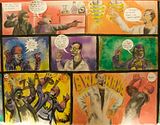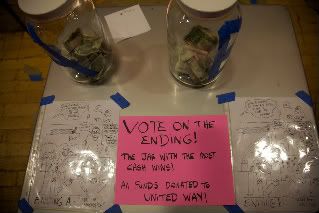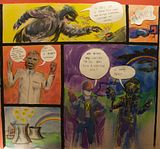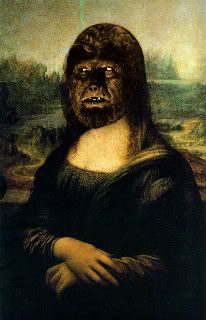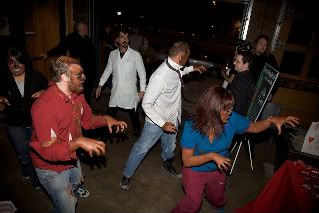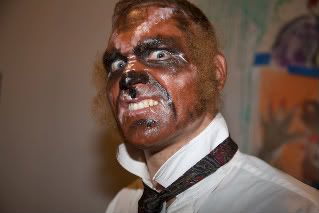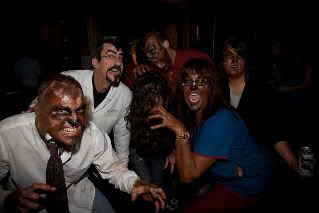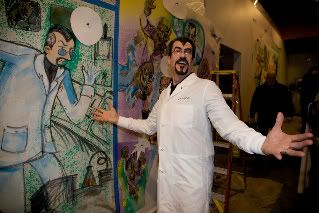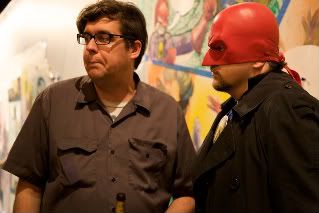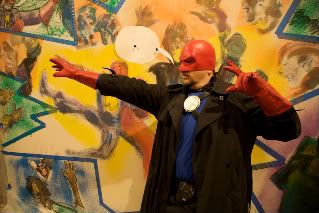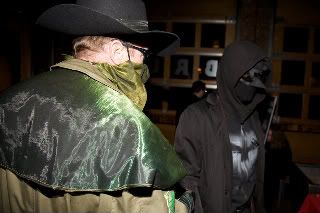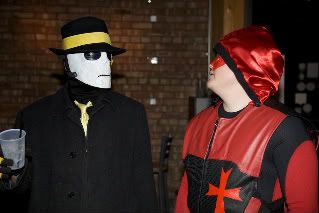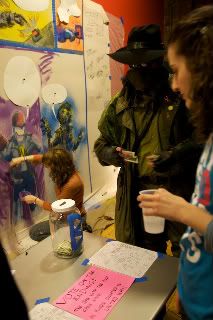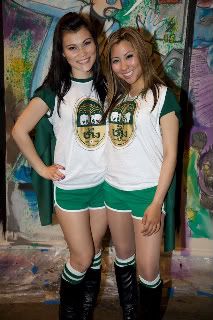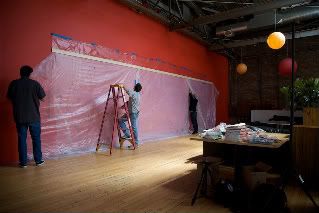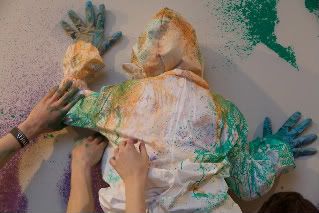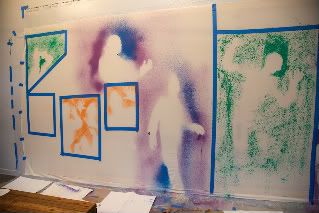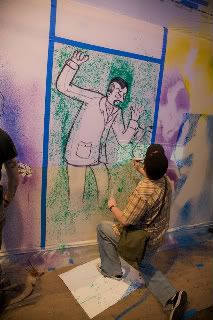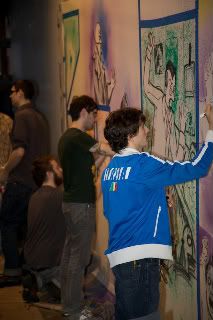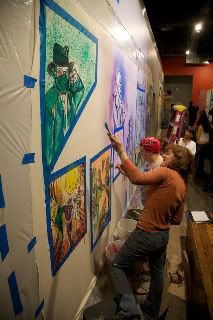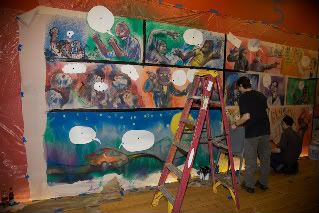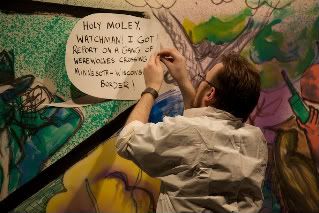
Photo by Rob Greig
Note: The following article was written by me for a UK publication titled
Delayed Gratification, which is a quarterly almanac that examines the prior three months worth of news in a brilliant way and with a dynamic lay out in a style they call "slow journalism." I absolutely love the publication. The article focuses on the UK's newly formed Justice Union and gives a run down of a few others in the RLSH world. Editor
Marcus Webb also contributed to the article.
Delayed Gratification's website can be found here:
www.dgquarterly.comMEET THE JUSTICE UNIONOn 13th March, five men tired of the crime they saw around them banded
together to make a stand. Is this an example of the Big Society at work?
Only if Cameron’s vision included martial arts, face masks and outfits ordered
from eBay. Tea Krulos meets The Justice Union, the UK’s real life superheroes.
Portraits by Rob Greig. Additional reporting Marcus Webb.Outside a McDonald’s somewhere in Salford, a speeding Land Rover screeches to a halt, and two suspicious characters exit the vehicle. Something isn’t right – they feel like they’re being watched, as if someone’s eyes are piercing them. Looking around, they spot a young man wearing a blue Lycra hood, a black eyemask similar to Zorro’s and a black leather trench coat.
He is Knight Warrior,
a “Real Life Superhero.”“I stood a fair distance away getting ready to do something because it looked like a robbery was going to happen,” Knight Warrior says of this incident. “They looked around and saw me watching. As they saw me they drove off.” If this was a potentially bad situation thwarted by Knight Warrior’s presence, then he has achieved what the Real Life Superheroes are all about: small victories.
The Real Life Superhero (or RLSH) movement started as an American phenomenon, but has since spread to include costumed thrillseekers looking to help out their fellow man around the world. Over the last couple of years, a handful of British citizens have got in on the act with their own larger-than-life personae. Some, such as The Statesman and Lionheart, operate independently, but a group of five new superheroes have formed their own “super team”. After months of discussion, they decided to call themselves ‘The Justice Union’ and opened the closest thing they have to a hideout – a Facebook page – on 13th March.
The group includes Terrorvision, a man from Kent in his mid-thirties who does graphic design work and is co-owner of a music recording studio. He is married and has a family. Dark Spartan patrols town centres and residential areas around Torbay at closing time. He too is married, “outing” himself as a hero to his wife after a series of packages – including a police riot shield, body armour and a cast iron Spartan helmet – started arriving at their house. Rounding out the team are three superheroes in their late teens: Man in Black, Knight Warrior and Blackvoid.
Blackvoid has a part-time job at a comic-book store in Plymouth, wears a Spandex mask and makes his own weapons, including a spring-loaded contraption that fires what looks like golf tees. Knight Warrior also has a Spandex mask and is secretive about his personal life. Man in Black has adopted a classic film noir look – a suit, a fedora and a scarf covering the lower half of his face. What these superheroes and crusaders like them around the world define as their mission varies. Some hit the street looking to stop crime, others have a more humanitarian or charitable focus, and some a balance of both.
“My goal is to squash the socially acceptable apathy our country has adopted. I want to motivate “normal people” to help others,” Dark Spartan says. He tries to connect with the public by handing out his business card and fridge magnets to people while on patrol. Like the rest of the heroes, he also has a Facebook page. His day job is spent working in finance where he says he also encounters a fair amount of corruption.
“I hope to achieve lower crime rates and help the homeless to have more of a chance at life,” Blackvoid says, explaining his goal. “I do also want some public interaction.”
There may be anywhere from ten to 15 active RLSH in the UK, but keeping a headcount on a secret society is a hard task. The Justice Union is not the UK’s first superhero team. A couple of years ago there was a short-lived team with a similar name, the Union of Justice, featuring heroes like Captain Champion and Black Arrow, but those RLSH have since “retired”, moved on, or disappeared into
the night.
Superheroes: a secret historyWhen people hear of the RLSH, many erroneously believe this is something new, probably inspired by films like ‘Kick-Ass’. The reality is that the concept goes much further back, to at least the 1970s, where we find some of the earliest recorded prototypes. Included in that line-up is The Fox, a shadowy environmental activist and Captain Sticky, a rotund man who drew attention to issues he was advocating with his flashy superhero costume.
The first known usage of the term “real life superhero” can be found in a small-press book by a mysterious individual named Night Rider. The rare book was titled ‘How to Be a Superhero’ and was published in 1980. Since then, occasional crusaders have popped up here and there. Super Barrio, of Mexico City dressed as a luchador wrestler and championed working and housing rights in the mid-’80s. Captain Jackson, meanwhile patrolled the small town of Jackson, Michigan, from 1989 onwards.
The notorious Angle Grinder Man, angry at heavy-handed parking laws, spent the early 2000s sawing through wheel clamps on the streets of London. Motorists could get in touch with the vigilante through a hotline and soon Angle Grinder Man would arrive on the scene, firing up his namesake machine. There is no record of him after 2005.
The year 2005 is also when what is now considered the modern Real Life Superhero Movement began to develop rapidly. Hundreds of people have since signed up for the idea. Anyone can become a RLSH: there is no central organisation, list of rules, or membership dues, which has led to a wide diversity of participants in the movement.
On the streets…This wide range of RLSH, of different political, religious, social, and economic backgrounds, has networked across America.
Phoenix Jones, the catalyst for a lot of media interest, seemed to appear out of nowhere late last year, and for unknown reasons captured the media’s attention. He patrols the streets of Seattle up to five nights a week with his team, the Rain City Superhero Movement.
North of him, in Vancouver, Canada, is Thanatos, a 61-year-old Vietnam vet. Thanatos hands out supplies to Vancouver’s large homeless population, in addition to doing some detective work. Motor Mouth, of San Francisco, leads the Pacific Protectorate who swung into action attempting do-it-yourself crowd-control during riots in Oakland, California last July.
One of the largest teams out there is the New York Initiative, which was started with four members living together in a small Brooklyn apartment. The team now has more than a dozen members who do community outreach and patrols throughout the city’s five boroughs.
The Great Lakes Alliance is a team of superheroes of the Midwest. Team members include Razorhawk and Geist of Minnesota and The Watchman of Milwaukee, Wisconsin plus his associate Blackbird. All four of these RLSH do patrols that are the equivalent of a costumed neighbourhood-watch group, as well as charity fundraisers and other events.
The Justice UnionNow joining this roster of American teams is the Justice Union. Like most RLSH, they seem to agree about what has motivated them to join forces: they are tired of seeing reports of crime and feeling helpless.
“I’ve seen a lot of bad things happen where I live,” The Justice Union’s Knight Warrior (of Manchester) says. “People getting beat up at the bus stop and handbags getting snatched and people standing by and doing nothing.”
The newly formed team admits that collaborating in person will be a challenge, since there is a fair distance between all five of them, although Blackvoid and Dark Spartan are planning on teaming up in late April, and a full team meeting to hand out supplies to the homeless, followed by a patrol, is scheduled for August, possibly in Manchester.
“I would like to see the whole group do a patrol in a well-known crime area at the same time,” says Man in Black. “If we’re in different areas of that town we can have a greater chance of stopping crime. The main obstacle I see is the distance between our areas.”
To prepare for this fight, most members say they have been training in martial arts. Unlike their American counterparts, there are very few legal weapons they can carry, so their arsenal consists of torches, first aid kits and binoculars. The most heavily armoured is Dark Spartan, who dresses from head to toe in police riot gear and carries a riot shield. Knight Warrior is looking into getting a bulletproof vest.
The superheroes have encountered police a couple of times while on patrol, and report the meetings as positive exchanges.
Knight Warrior says he posed for a photo with an officer, who suggested he should call if he needed help. Dark Spartan crossed paths with police four times in one night. “They were really supportive and thought it was a great idea,” he says.
In the States, police reaction has been mixed. Some appreciate the effort; others are concerned about the heroes getting in over their heads. The standard line is usually something like, “We appreciate citizens helping the police out, but leave the crime-fighting to us.”
In the UK, The Statesman reports that he and his fellow heroes Barns and Vague (both of whom now seem to have vanished) actually helped police chase a criminal in 2009. The trio were hanging out in Trafalgar Square at 3.30am when they saw a man running from two WPCs.
“I’m proud to say that nobody hesitated,” Statesman recalled in a journal entry. “We were off after the getaway, pounding up the steps and away out of the square. I was right behind the crim as he ran, and we ploughed around the corner. The street ahead was empty. We stopped, and caught sight of our man, huddled in a shop doorway and trying to cram himself into the shadow.” The trio stared down the criminal. Statesman wrote, “After a cold few seconds of eye contact, the WPCs caught up and the crim gave up – he held his hands out for the cuffs and
was placed under arrest for a previous charge and failure
to appear.”
It was another small victory for the RLSH. When asked what their ultimate goal as a superhero was, all five members of The Justice Union gave an almost identical answer:
“To make a difference in society.”
It’s a sentiment that might be appreciated in Downing Street. Outlining his vision of the UK’s future in February, David Cameron said: “I don’t believe it is impossible to do your duty at the same time as having a sense of mission and purpose about what would make this country stronger, better, a nicer place to live.” They might not take the form he was expecting, but for vocal, active examples of the Big Society in action, the members of The Justice Union might just be the ambassadors he’s been looking for.



